Exclusive 3:16 Interview With Wilhelm Dilthey
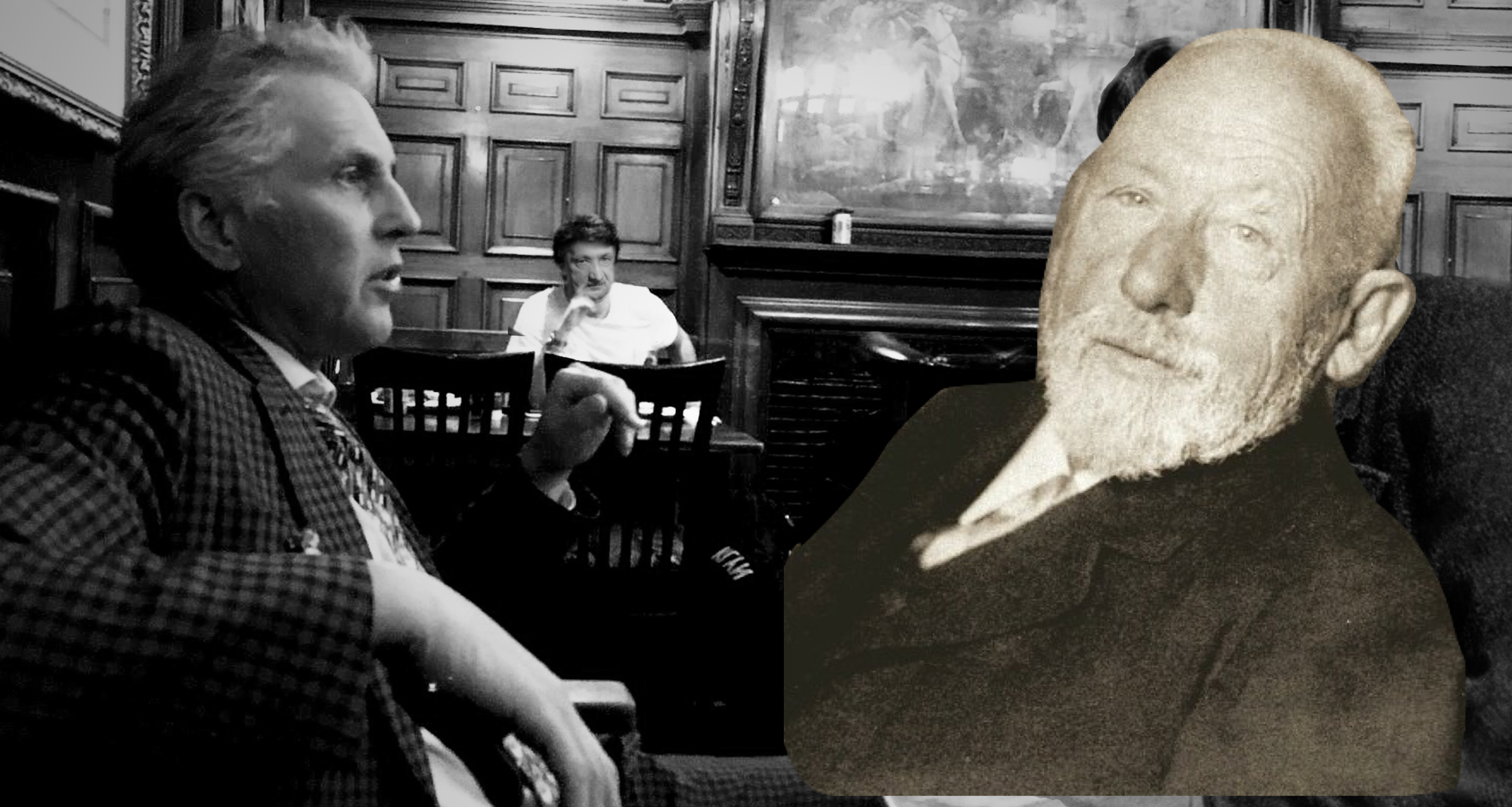
Interview by Richard Marshall
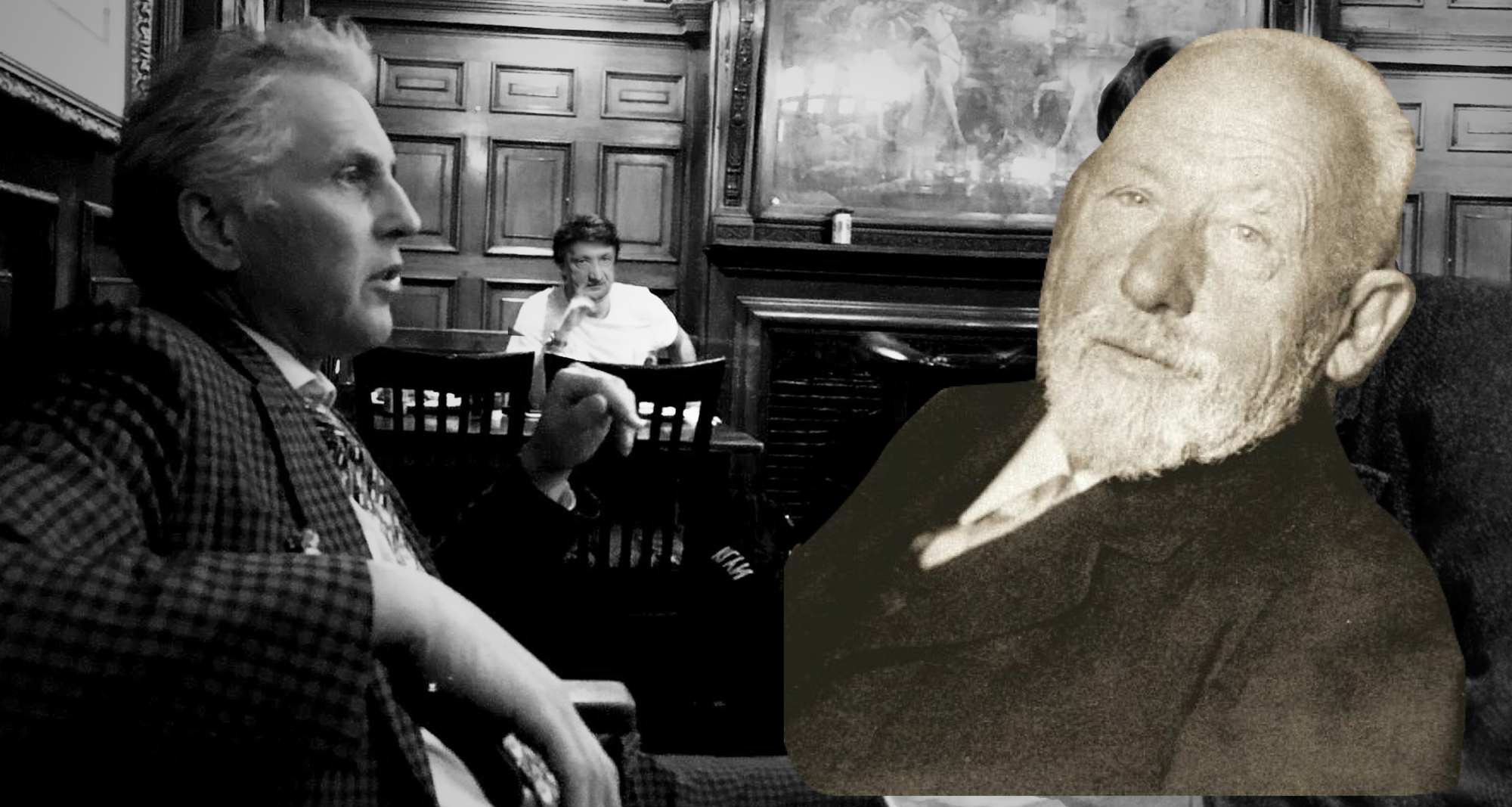
Wilhelm Dilthey was born in Biebrich on the Rhine in 1833, two years after Hegel had died. Dilthey’s ambivalent attitude towards Hegel can provide some initial clues about his own philosophical approach. He admires Hegel’s recognition of the historical dimension of philosophical thought, but rejects the speculative and metaphysical ways he developed this relation. Like the Neo-Kantians, Dilthey proposes a return to the more focused viewpoint of Kant, but not without also taking account of the higher emancipatory aspirations and broader perspectives of later thinkers such as Fichte and Hegel.
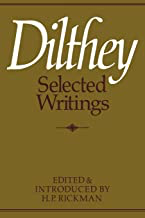
3:16: What made you become a philosopher?
Wilhelm Dilthey: Kant. Following Kant’s critical path, I want to establish an empirical science of the human mind in collaboration with researches from other disciplines; it is now time to know the laws that govern social, intellectual and moral phenomena.
3:16: Ambitious. How did you propose to do this?
WD: Provide an epistemological foundation for the sciences of the mind with a critique of historical reason. I see philosophy as an experiential science of spiritual phenomena out to cognize the laws governing social, intellectual and moral phenomena
3:16: So you are the Kant of history, as Droysen called you!
WD: Well, not really. In the veins of that knowing subject constructed by Locke, Hume and Kant there runs no real blood but merely the thinnest vapour of reason.
3:16: So Kant’s got too intellectualist a version of reason for your liking?
WD: Too right he has. The existence of inherent limits of experience in no way settles the question about the subordination of facts of the human world to our knowledge of matter.
3:16: You also think he removed forms of thought and perception from history and this was a mistake?
WD: Right. Not the assumption of a rigid a priori of our faculty of knowledge, but only its historical development can answer the questions that we have to direct towards philosophy. Man as a fact prior to history and society is a fiction.
3:16: So metaphysics is always based on worldly realities?
WD: That’s the point. For example, ancient metaphysics underwent many changes at the hands of medieval thinkers who brought it in line with the dominant religious and theological movements of their day.
3:16: I notice that Carnap liked you approach to metaphysics – he replaces your ‘facts of consciousness’ with ‘elementary experiences’ but it closely resembles your approach.
WD: Well, I see metaphysics as ‘lifestyle’, as does he I think.
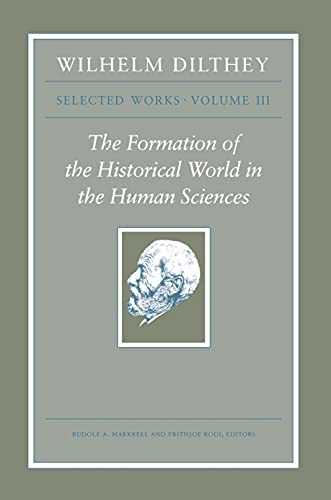
3:16: So you’re out to run a historical critique of reason – and you’re self-consciously doing this before Nietzsche?
WD: Indeed.
3:16: You’re a Christian too aren’t you, and did theology as a student – does your philosophical outlook define what you’re interested in when it comes to religion?
WD: Yes, it is my calling to apprehend the innermost nature of religious life in history and to bring this to the attention of our times which are moved exclusively by matters of state and science. Life experienced religiously is experienced according to its true nature—full of hardships and a singular blend of suffering and happiness throughout— we are pointed to something strange and unfamiliar, as if it were coming from invisible sources, something pressing in on life from outside, yet coming from its own depths.
3:16: Could your human sciences stand independently of metaphysical (Idealist) and natural science foundations? Could they be autonomous in this sense?
WD: What gives scientific status to human science is its purely empirical manner of investigation, its loving absorption in the particularities of an historical event, a universal spirit of historical investigation that determines the worth of every set of facts from its context of development. Historical science is the new scientific revolution Richard. The lived experiences which could not find adequate scientific expression in the substance doctrine of rational psychology are now validated in light of new and better methods.
3:16: What’s the difference between natural and human sciences then?
WD: Facts of consciousness. The analysis of these facts is the centre of the humanities or, as Mill might call them, the moral sciences. I prefer moral-political sciences, or sciences of the practical world. The sciences which take socio-historical reality as their subject matter are seeking, more intensively than ever before, their systematic relations to one another and to their foundation. Thus, in accordance with the spirit of the Historical School, knowledge of the principles of the human world falls within that world itself, and the human sciences form an independent system. Modern science can acknowledge no other than this epistemological stand-point. If we conceive all the changes in the physical world as reducible to the motion of atoms, motions generated by means of the fixed nuclear forces of those atoms, the whole of the world could thus be known by means of the natural sciences.
3:16: How do you conceive of the success of natural sciences?
WD: The conditions sought by the mechanistic explanation of nature explain only part of the contents of external reality. This intelligible world of atoms, ether, vibrations, is only a calculated and highly artificial abstraction from what is given in outer and lived experience.
3:16: What changes must a human science make to the approach of the natural sciences then?
WD: Replace the abstraction of the natural sciences with analysis. Abstraction is distinguished from analysis in that the former singles out one fact and disregards the others, whereas the latter seeks to apprehend the majority of the facts that make up the factors of a complex whole.
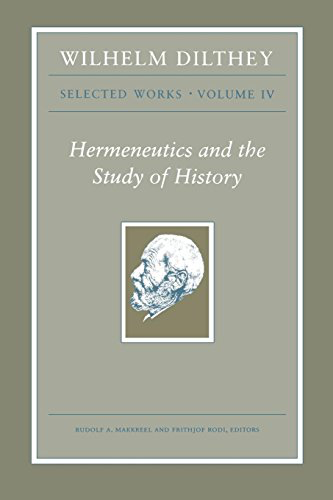
3:16: Windelband criticized you for making the distinction substantive rather than methodological. What do you say to him?
WD: We explain nature, but we understand the life of the mind. We study lived experience and our awareness of corruptibility. The nature of real time is the steady sinking of the present backwards into the past and the making present of what we have expected, wanted or feared.
3:16: So this lived inner experience involves our sense of mortality and our encounters with the world?
WD: Yes. I condemn the explanatory psychology of James Mill, John Stuart Mill, Spencer, Herbart, Fechner and Helmholtz. It’s science without the tests. It doesn’t do justice to the complete contentality of mental life. Consciousness of lived experience and its constitution are one. Lived experience does not exist as an object for the observer apprehending it, but is indistinguishable from what it is for me.
3:16: You once said that the principle of phenomenality is the first principle of psychology and philosophy. What is this?
WD: All objects , including even persons, with which I stand in relation, exist for me only as facts of consciousness.
3:16: Didn’t Descartes and Hume make this the starting point of methodological skepticism? And for Berkeley, didn’t he think it meant there was only perceptions?
WD: From the fact that the object is for me only from my perceiving it, only from percipi, it does not follow, as Berkeley concluded, that this percipi dissolves all esse. From the fact that percipi is the only manner in which esse is for us, it does not follow that esse cannot be in some other sense. If there is any universal truth for the human being, it must be that thought should begin from the facts of consciousness and proceed toward the reality of the external world. The reality of our inner states is the basis for all knowledge.
3:16: Have you changed your mind now and abandoned all this psychology stuff?
WD: Well Richard, the whole of psychology is problematic for the indefinite future. But nevertheless in psychology it is precisely the connectedness that is originally and continually given in lived experience: life presents itself everywhere only as a continuum or nexus. After all, each state of consciousness simultaneously contain some kind of representing, feeling, and willing. Once external conditions evoke a sense of pressure or intensification in the sphere of feeling, a striving comes about to either maintain or to modify a given state.
3:16: So do you disagree with the Cartesian and Kantian presupposition that the knowing subject is self-sufficient?
WD: Yes I’m afraid I do Richard. Man as a fact preceding history and society is a fiction, whereas the real man , which sound analytic science takes as its object, is the individual as a component of society.
3:16: So you agree with a lot of contemporary philosophers that introspection can’t be a source of self-knowledge?
WD: What man is he knows not from soul-searching, still less from psychological experiments, but from history. Whether a knife is sharp is best known from cutting. The fruitfulness of a method can only be determined by whether one makes discoveries with it. The inner experience through which I obtain reflexive awareness of my own condition can never by itself bring me to a consciousness of my own individuality. I experience the latter only through a comparison of myself with others.
3:16: For you then our knowledge of the world isn’t an inference based on Cartesian cause to effect nor a Kantian one of inner to outer sense nor even a Rickertian postulate of understanding?
WD: No. Impulse, pressure, resistance are, as it were, the firm elements that import solidity to external objects. Will, struggle, work, need, satisfaction are the constantly returning primal elements, which make up the structure of spiritual events. Here is life itself. It is forever its own proof. In the real life-process, willing, feeling, and thinking are only different aspects. For the whole human being who wills, feels, and represents, external reality is given simultaneously and with as much certitude as his own self.

3:16: So psychic life’s not constructed synthetically from discrete elements but is a stream of consciousness differentiating itself from within?
WD: To the extent that the parts of the experiential nexus are connected structurally so as to link the satisfaction of the drives and happiness and to reject suffering, we call this nexus purposive. It is solely in psychic structure that the character of purposiveness is originally given, and when we attribute this to an organism or to the world, this concept is only transferred from inner lived experience. Every relation of parts to a whole attains the character of purposiveness from the value that is realized in it. This value is experienced only in the life of feelings and drives.
3:16: Do we live to mature or has every experienced time got intrinsic worth?
WD: Nothing can be more erroneous than viewing maturity as the goal of the development that constitutes life and thus transforming the early years into mere means. How could those years serve as means to a goal which in each case is so uncertain? Instead, it is part of the nature of life to strive to fill each moment with a richness of value.
3:16: What are attitudinal stances of the psychic?
WD: Asking, believing, presuming, claiming, taking pleasure in, approving, liking and its opposite, wishing, desiring, and willing are such modifications of the psychic attitude.
3:16: One of the things about the humanities is that things are not just comprehended as phenomenal objects but as real for our life concerns aren’t they?
WD: Yes. All this “about”, “of”, and “toward”, all these references of what is remembered to what is experienced, in short, all these structural inner relations, must be apprehended by me, since I now want to apprehend the fullness of the lived experience exhaustively. And precisely in order to exhaust it, I must regress further in the structural network to the memories of other lived experiences. Whether we feel our own state or some object, it involves only a state of being as a kind of attitude. The way this state of being depends on outer objects or on the state of the subject is obscured through an inverse attitude that loses itself in the depth of the subject.
3:16: Can we conceptualise cultural systems in terms of the idea of purposes alone ?
WD: No. The individuals who cooperate in such a function belong to the cultural system only through those processes by which they contribute to the realization of the function. Nevertheless, they participate in these processes with their whole being, which means that a domain based purely on the system’s functional purpose can never be constructed. Rather, other aspects of human nature are also constantly at work in this domain supplementing the energies devoted to the system’s functions.
3:16: Does inner reality have to be psychological?
WD: No. Take drama: it expresses not the inner processes in the poet; it is rather a nexus created in them but separable from them. The nexus of a drama consists in a distinctive relation of material, poetic mood, motif, plot, and means of presentation. So too, any expression of lived experience can contain more of the nexus of psychic life than any introspection can catch sight of. It draws from depths not illuminated by consciousness. But at the same time, it is characteristic of an expression of lived experience that its relation to the spiritual or human content expressed in it can only be made available to understanding within limits. Such expressions are not to be judged as true or false but as truthful or untruthful.
3:16: Is it possible to find something like the soul of a people?
WD: I think not Richard. Such things are no more usable in history than is the concept of life-force in physiology. We should analyse cultural systems and external organizations of societies whose enduring causes bind the wills of many into a single whole.
3:16: Yet you expand Hegel’s notion of objective spirit to include not just the sciences but also art, religion and philosophy don’t you?
WD: From earliest childhood, the self is nurtured by this world of objective spirit. It is also the medium in which the understanding of other persons and their life-manifestations takes place. For everything in which spirit has objectified itself contains something that is common to the I and the Thou. Every square planted with trees, every room in which chairs are arranged, is understandable to us from childhood because human tendencies to set goals, produce order, and define values in common have assigned a place to every square and every object in the room. We understand individuals by means of their affinities, their commonalities. This process presupposes the connection between the universally human and individuation. On the basis of what is universal, we can see individuation extended to the manifoldness of human existence. Understanding as such is an operation running inverse to the course of production. But a fully sympathetic reliving requires that understanding go forward with the line of the events themselves. A lyrical poem makes possible, through the sequence of its verses, the re-experiencing of a nexus of lived experience—not the real one that stimulated the poet, but the one that, on its basis, the poet places in the mouth of an ideal person.
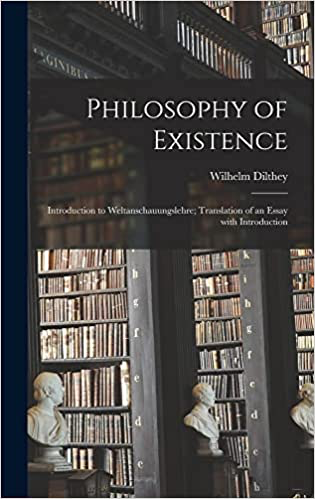
3:16: So the productive nexus of history and the humanities differs from that of nature by producing values?
WD: The carriers of this constant creation of values and goods in the world of human spirit are individuals, communities, and the cultural systems in which individuals cooperate. This cooperation is determined by the fact that, in order to realize values, individuals subject themselves to rules and set themselves purposes. All these modes of cooperation manifest a life-concern connected to the human essence that links individuals with each other—a core, as it were, that cannot be grasped psychologically but is revealed in every such system of relations among human beings.
3:16: How important is analysis of the state in your approach?
WD: The authority of the state encompasses only a certain portion of the collective power of the populace and even when state power exerts a certain preponderance it can do so only through the cooperation of psychological impulses.
3:16: Although you say state’s don’t have souls, you do think they have commonalities that give them a sense of solidarity for individuals don’t you. Aren’t there dangers in that?
WD: When people start placing the highest value not in the serene world-view of the Greeks, not in the intellectually delimited consideration of purpose of the Romans, but in the raw exertion of power without any limit then yes, I have worries.
3:16: What makes your philosophical approach new?
WD: What is new in my method is the connection of the study of man with history.
3:16: I guess Hegel’s the godfather of this approach?
WD: I suppose so . My project follows the tendency of the phenomenology of spirit. I’m looking to reach objectivism from the execution of the empirical standpoint.
3:16: You’re well known for saying that understanding rather than explanation is what you think we should be doing in the humanities, following Schleiermacher on hermeneutics in this respect. So what is understanding according to you?
WD: Understanding is what we call this process by which an inside is conferred on a complex of external sensory signs. Even the apprehension of our own states can only be called understanding in a figurative sense. To be sure, I say: "I can’t understand how I could have acted thus," and even, "I don’t understand myself anymore." Yet what I mean by this is that an objectification of my own being in the external world now stands before me as that of a stranger and that I am unable to interpret it, or alternatively that I suddenly find myself in a state that I stare at, so to speak, something alien to me. We therefore call understanding that process by which we recognize, behind signs given to our senses, that psychic reality of which they are the expression. Such understanding ranges from grasping the babblings of children to ‘Hamlet’ or the ‘Critique of Pure Reason’.
3:16: And what are the laws of metamorphosis?
WD: They’re about how the same image can no more return than the same leaf can grow back on a tree the following spring. They’re laws of apperception guided by the acquired nexus of psychic life. Images are transformed when they expand or contract, when the intensity of the sensations of which they are composed is increased or decreased. Only when the whole acquired psychic nexus becomes active can images be transformed on the basis of it: innumerable, immeasurable, almost imperceptible changes occur in their nucleus. And in this way, the completion of the particular originates from the fullness of psychic life. around one especially noticeable point, which I will call the aesthetic point of impression. Every carefully observed face is understood on the basis of such a dominant impression . On the basis of this impression and repeated memory, indifferent features are excluded, while telling features are stressed and refractory ones de-emphasized. The remaining whole is unified ever more decisively.
3:16: It’s something to do with intersubjectivity yes?
WD: Intersubjectivity is the objective spirit which is the manifold form in which the communality among individuals objectifies itself in the sensible world. In the case of lived experience, there is no difference between an object that is perceived and the eye that perceives it. We explain by means of purely intellectual processes, but we understand by means of the cooperation of all the powers of the mind in comprehension. In understanding we start from the connection of the given, living whole, in order to make the past comprehensible in terms of it. If there were a science of human beings it would be anthropology that aims at understanding the totality of experience through structural context.
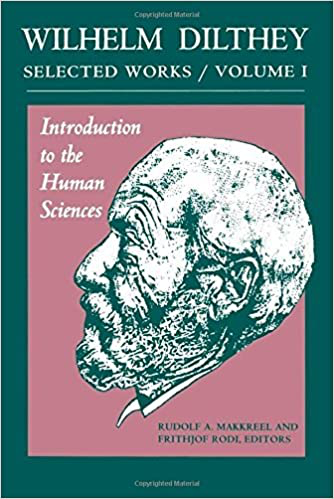
3:16: Is understanding based on intuition, like Collingwood thought?
WD: No, that’s aesthetical mysticism and enthusiastic obscurity.
3:16: But don’t you say that higher forms of understanding aren’t rational, that they come from imagination, empathy and sympathy?
WD: So in all understanding there is something irrational, just as life is such; it cannot be represented through any formula of logical activity.
3:16: What is your philosophy of life about?
WD: Reformulating Kant. ‘I think’ becomes ‘I live’. The ‘I think’ must be able to accompany all my representations. The positive or negative value of the realities that fill it are experienced through feeling. And when we face the future, the category of purpose arises through a projective attitude.
3:16: So autobiography has a special place in understanding the human involvement in history?
WD: Here a life-course stands as an external phenomenon from which understanding seeks to discover what produced it within a particular environment. The person who understands it is the same as the one who created it. This results in a special intimacy of understanding. Through biographical selective memories explicating a historical nexus are already half solved by life itself. An individual does not face a limitless play of forces in the historical world: he dwells in the sphere of the state, religion, or science—in brief, in a distinctive life-system or in a constellation of them. The inner structure of such a constellation draws the individual into it, shapes him, and determines the direction of his productivity. Historical achievements stem from the possibilities inherent in the inner structure of a historical moment. Each of these histories has its own center to which the processes are related and consequently the values, purposes, and significance that result from this relationship.
3:16: You say that our psycho-ethical understanding of the feelings that can motivate us to act must be rooted in anthropological analysis of our inner drives, instincts and desires. Does this mean that we’re basically motivated by feelings? Isn’t this a bit like the notion of ‘sympathy’ we find in the British moralists?
WD: Sympathy, compassion, and pity are modes of “suffering with” that are derivative because they affect us from the outside. They involve an external conjoint movement and are superficial.
3:16: So if not sympathy, what?
WD: Group solidarity. The feeling of duty and justice, the consciousness of the commitment that inheres in the duty to do what is right or just based on fidelity to oneself and respect for the self-worth of other persons. Respect others as ends in themselves.
3:16: So it’s all based on reciprocal human connectedness. This sounds pretty Kantian.
WD: Thank you.
3:16: So this is the same thing that Nietzsche, Schopenhauer, Tolstoy, Bergson and Carlyle were all endorsing in various forms yes?
WD: The subject of my philosophy is just life as lived by human beings. I use the expression ‘life’ in the human sciences in its limitation to the human world; it is definite in its meaning and exposed to no misunderstanding, it if is used in this sphere.
3:16: So philosophy can’t transcend human experience?
WD: No it can’t.
3:16: So what’s this human life?
WD: Life is the totality of what we live through and understand as a whole comprising of the human race. Life consists in the interchange between life unities – the individual human beings. Life is the whole of the interchanges taking place between people, conceived apart from changing times and places, under conditions of the external world.
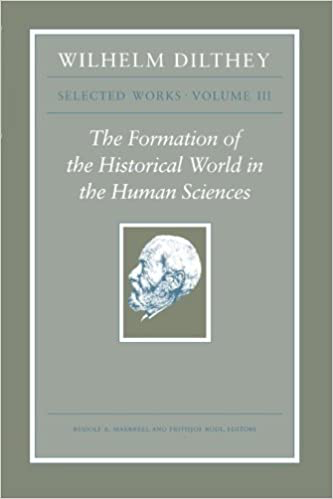
3:16: Can life be understood individualistically?
WD: Well, it would be a mistake if one wanted to limit history to the cooperation of human beings working towards common ends. The singular person in his individual existence is an historical being. He is determined by his place in the line of time, by his place in space, by his position in the confluence of cultural systems and communities.
3:16: So can we fathom our experiences? Is life explicable to us?
WD: The understanding cannot get behind life, whose function it is. What is experienced from within cannot be categorized in concepts that have been developed for the external world of the senses. In the case of lived experience, there is no difference between an object that is perceived and the eye that perceives it.
3:16: There’s the whiff of the ineffability paradox here it seems to me.
WD: Well Richard, paradox is a characteristic of truth.
3:16: On the other hand you do seem to want to place experience within the realm of experience, which would run against this ineffability thesis?
WD: Well, in vain did Nietzsche seek in lonely self-reflection his original nature, his a-historical essence. He peeled away one layer of skin after another. And what remained? Only something historically conditioned: the traits of the powerful people of the Renaissance. What man is he knows only from his history.
3:16: Are you a relativist?
WD: There’s an antinomy between historical consciousness and the claim to universal validity. What is conditioned in its historical relations should also be relative in its value or validity. World history as world judgment shows each metaphysical system to be relative, transitory, perishable. Part of me thinks the knife of historical relativism which has cut to pieces all metaphysics and religion must also bring about healing.
3:16: So what’s the solution to this?
WD: The meaning of history behind all world history!
3:16: But I thought you were against that sort of thing?
WD: I was. Am. Look, I undertook an investigation into the nature and conditions of historical consciousness – a critique of historical reason. In pursuing this task I ran into the most general of problems: an irresolvable contradiction arose when one follows historical consciousness to its final consequences. The final world of the worldview is the finitude of every historical phenomena – whether it is a religion, an ideal or a philosophical system – and hence the relativity of every kind of human view of the whole of things. On the other hand, there arises the need for universally valid cognition in thinking, and in the striving of philosophy. The historical worldview has been the liberator of the human mind from the last chains not broken by the natural sciences and philosophy. But where are the means of overcoming the anarchy of convictions that threaten to break in upon us? I have worked all my life on the resolution of the problems that connect with this one in a long chain. I see the goal. If I fall by the wayside I hope that all my younger colleagues, my students, will follow it to the end.
3:16: And are there 5 books you can recommend that will take us further into your philosophical world?
WD: Sure: 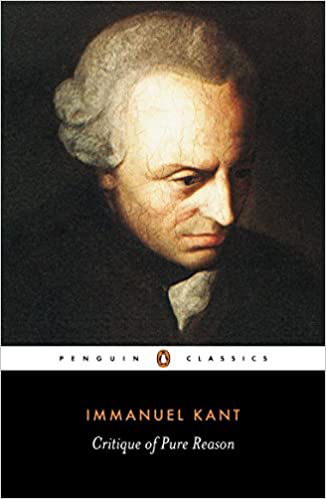
Kants’ Critique of Reason
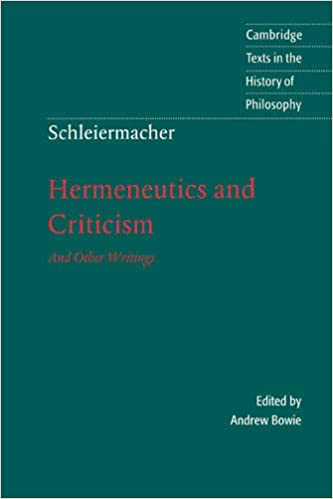
Schleiermacher Hermeneutic and Criticism
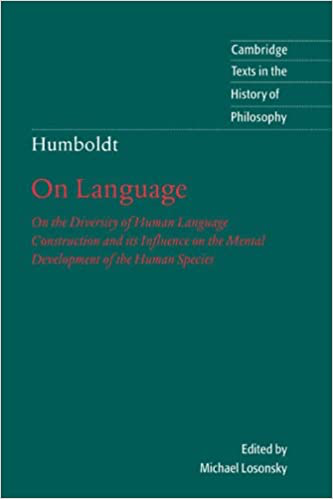
Wilhelm von Humboldt: On Language
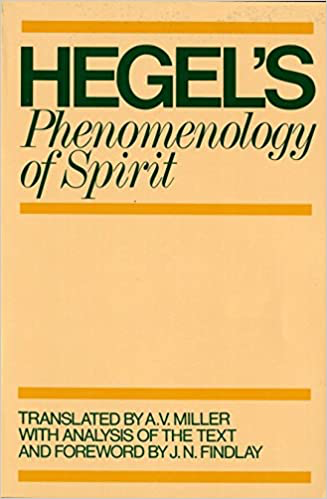
Hegel Phenomenology
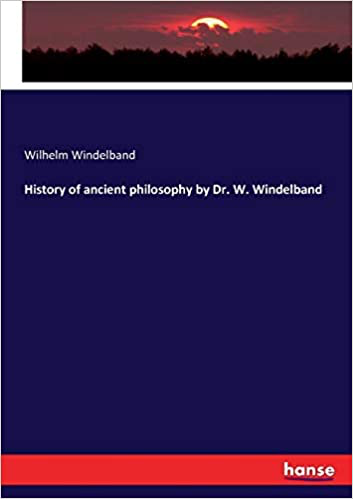
Windelband: History of Ancient Philosophy
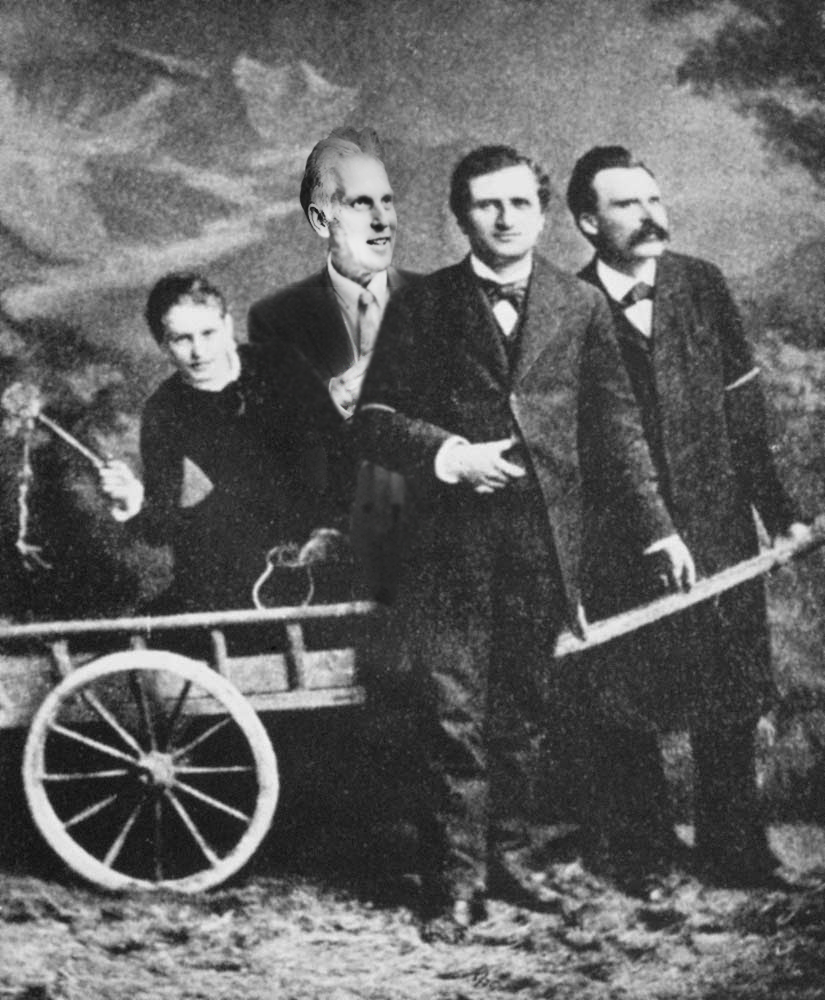
About the Author
Richard Marshall is still biding his time.
He has an exhibition of paintings done for the philosophy interviews starting on Friday - come along if you can.